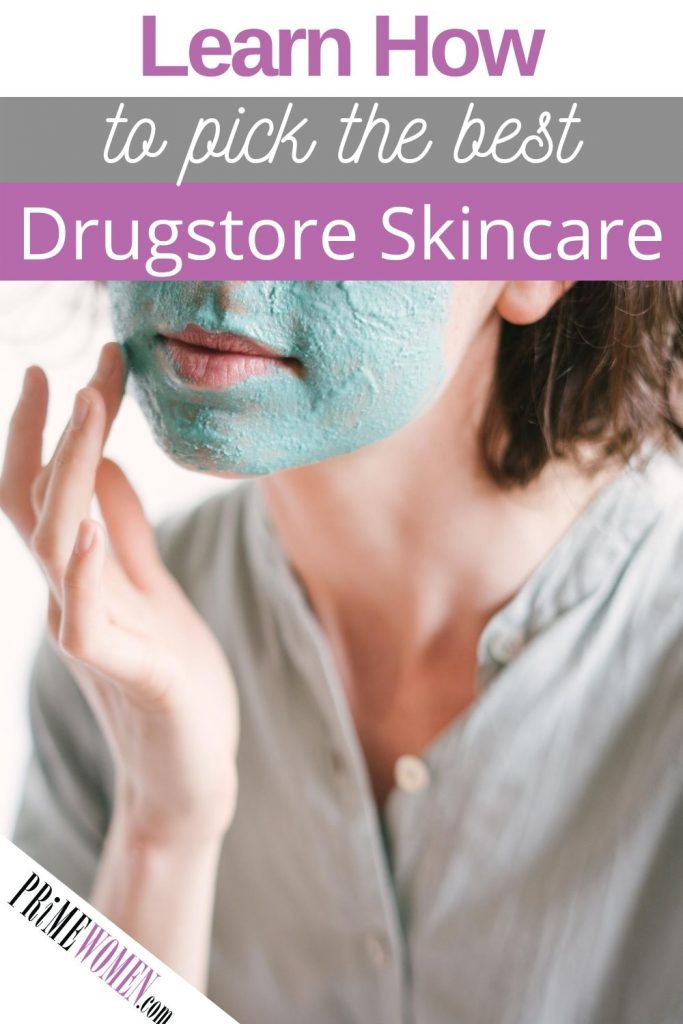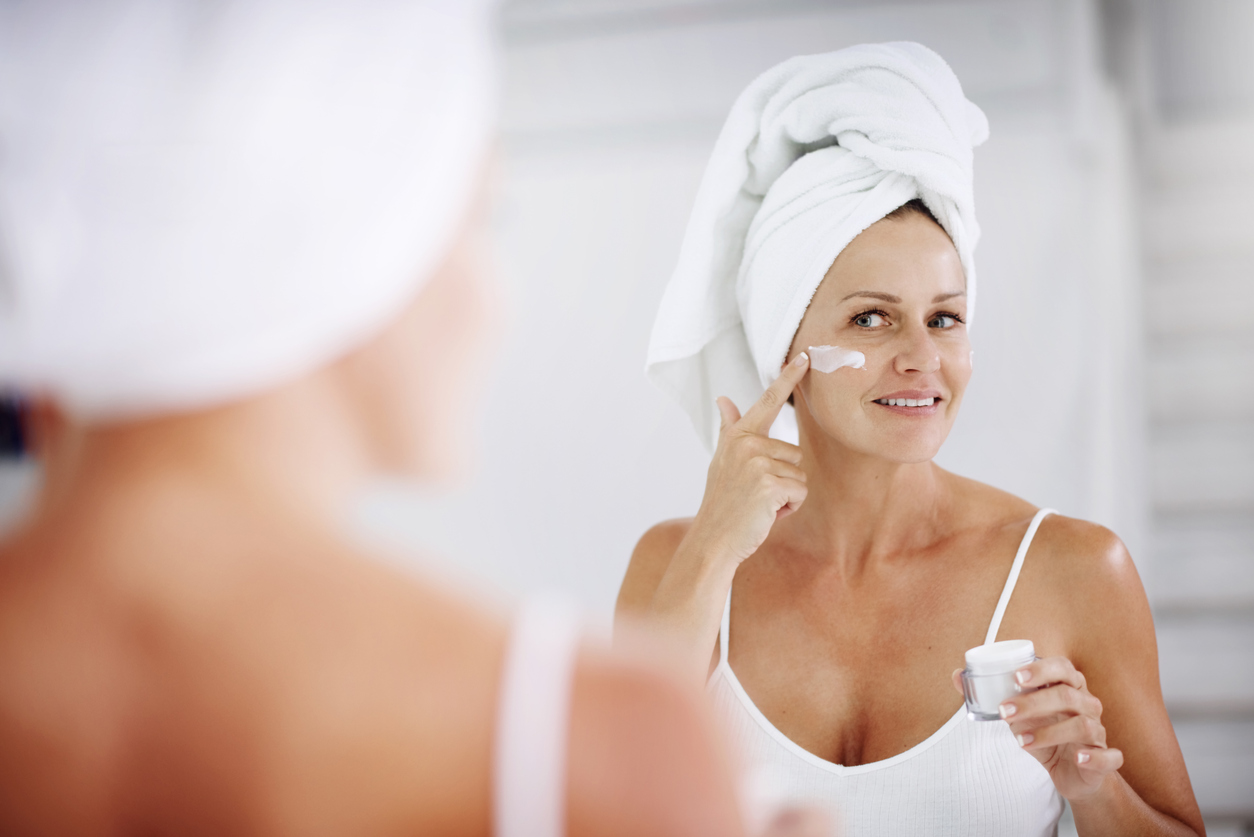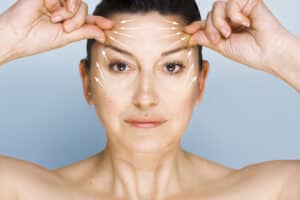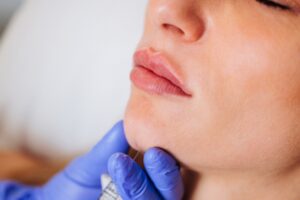The editors of Prime Women challenged me to recommend the best drugstore skincare products—inexpensive, over-the-counter products that work for Prime Women. I trotted down to the corner drugstore to see what was available. Like most dermatologists, I sell a line of products from the office that works well for my patients, so it has been a while since I explored what was available in the market.
How to Select the Best Drugstore Skincare
I did not look at the department store products since, on average, they are quite expensive, even higher than what we sell out of the office. In my opinion, the extra expense does not correlate with better results. It just means you have less money to spend on the procedures that really work, like Botox©, Dysport©, Xeomin©, and Sculptra©.
The choices were amazing, and I couldn’t imagine how the consumer makes up their mind. I can see why manufacturers hire celebrities to sell their products. Who doesn’t like Diane Keaton as the perfect prime woman to emulate? While I did purchase products, there was no way I could use them all over the length of time it would take to really evaluate them and get this article done on schedule. With products, it usually takes three to six months to see results, despite the marketing. Sure, I picked up the one that said it would remove wrinkles in 5 seconds, but that lasted about 5 minutes.
What to Look For on the Label
I decided to focus my search on products with the same active ingredients we sell in the office. Those three ingredients, which can be found in the best drugstore skincare products, are (drum roll): Sunscreen, Glycolic Acid, and Peptides, in that order of importance.
Sunscreen
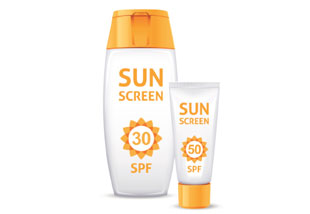
I know that the first one, sunscreen, comes as no surprise. But, just to illustrate how good an anti-aging product it is, let me tell you about a study that I was in 25 years ago as a dermatology resident in training. The study evaluated a prescription-strength retinoid cream to determine its effectiveness in anti-aging.
The volunteers were divided into two groups. We were each given an unlabeled tube of cream to use every night, and both groups were given a sunscreen moisturizer to use every morning. One group received the active ingredient in the tube, and the other group was using a placebo. The study was conducted over a year, and close-up pictures of my face were taken before and after. At the study’s conclusion, the pictures showed improvement in my facial wrinkles, skin texture, and color. I thought I must have used the active ingredient, but no, my tube was the placebo. The only thing that I had done differently was to use daily sunscreen. That was my “aha” moment about the importance of sunscreen moisturizers to prevent and even reduce the appearance of wrinkles.
Glycolic Acid
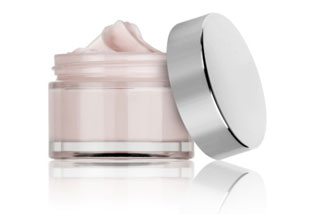
Glycolic Acid, which is part of the alpha hydroxy acid family, has also been confirmed by scientific studies to stimulate collagen, reduce pore size, and lighten brown spots. I started recommending glycolic acid for some of my patients instead of Retin A© back in the 90s because the glycolic acid was less irritating. While retinoids (tretinoin and retinol) have also been scientifically shown to improve the appearance of wrinkles, if a product is too irritating and not used regularly, the product’s efficacy decreases. Bottom line: no matter how well it works, if you are not using it daily, it will not be that effective.
Peptides
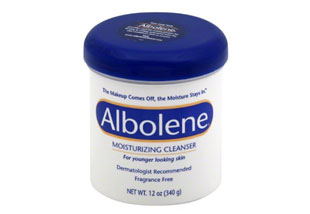
The final ingredient, peptides, has the fewest scientific studies to back it up, but they are in moisturizers that counteract the irritating effects of glycolic acid and retinoids. There is some evidence that wrinkles diminish with use.
Cleanser
The main thing about a cleanser is to use one that is gentle. You don’t want to dry your skin out, and a gentle cleanser allows you to use glycolic acid or retinoid (both can be irritating and both exfoliate). Aquanil, Cetaphil, and Neutrogena Ultra Gentle Daily Cleanser (foaming formula) all fit the bill. I recommend Albolene to remove eye makeup. Just rub a little on closed eyelids and gently tissue off the excess under the eyes. Then, use the gentle cleanser.
The best OTC glycolic acid regimen I could find was alpha-hydroxy. They have a website where you can find packages of anti-wrinkle starter kits for normal and dry skin that are under $25.00. Or, if your skin is not sensitive, you can purchase the intensive serum, 14% glycolic acid, for $18.99. Apply in the morning and follow with a good moisturizing sunscreen, like Eucerin Daily Protection Moisturizing face lotion SPF 30.
Do not apply glycolic acid in the morning if you will be out in the sun all day. Use it in the evening, instead. In the evening, you can moisturize over the glycolic acid with a peptide moisturizer, like Olay Regenerist or Studio 35 Beauty moisturizer/ serum; both contain peptides and green tea extract, which reduces inflammation.
I found one product that claimed to have both retinol and alpha hydroxy acid, Roc© Deep Wrinkle Serum. If your skin can tolerate it, you could use the glycolic acid in the morning with an SPF moisturizer and retinol at night with a peptide moisturizer. For some patients with sensitive skin, this might be too irritating.
The key is to choose a glycolic acid, and moisturizer with sunscreen in the morning, and moisturizer with peptides in the evening.
To boost the results, you can add retinol or use the glycolic acid product twice daily. Likewise, if your skin is dry, use the peptide moisturizer twice daily along with the sunscreen, which goes on last in the morning, and glycolic acid only once daily.
I hope I have not completely confused you, but one thing is for sure, as far as the best drugstore skincare products, these inexpensive alternatives with the right ingredients should leave a little more money in your pocketbook!
Read Next:
Makeup After 50: How to Contour for a More Beautiful You!
Easy Makeup Routine? Look No Further
